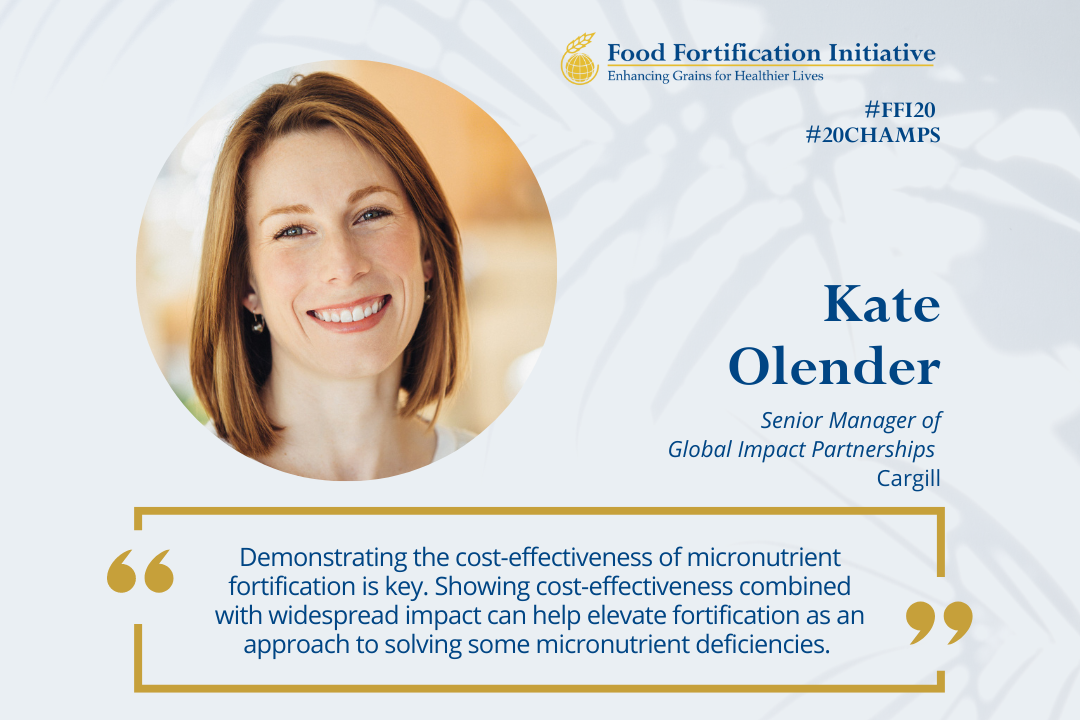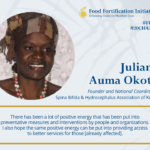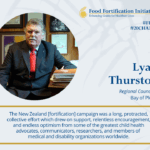Senior Manager of Global Impact Partnerships at Cargill

FFI: How did you become interested in nutrition?
Olender: I became interested in nutrition through my interest in food systems. Since childhood, I’ve cared deeply about many topics like health, animal welfare, the environment, poverty, and more. I discovered early on that food was one thing I could focus on that would allow me to have an impact on many of the topics I care about. As I learned more about food, agriculture, and food systems more broadly, I became interested in nutrition.
FFI: What inspired you to become involved with food fortification?
Olender: I went to school for public health and nutrition, and I remember learning about how the fortification of cereal grains with folic acid in the U.S. helped drastically decrease neural tube defects and is often considered one of our greatest public health achievements. I realized then that fortification is one of the tools that can help achieve at-scale health improvements. It’s one of the interventions that operates at the population level, as opposed to the individual level, and both are critical to improving health.
FFI: How is your organization prioritizing fortification?
Olender: For more than 150 years, Cargill has advanced nutrition through our business activities and our global, regional, and national corporate responsibility programs and partnerships. We believe that given our global reach and position across multiple supply chains, we have a unique opportunity to improve nutrition, fortification is part of these efforts. We’ve also partnered with the Food Fortification Initiative (FFI) for 15 years, supporting the organization’s advocacy around fortification legislation in countries around the globe. One of the leaders from our R&D team serves on FFI’s Executive Board, helping to provide strategic direction and technical knowledge.
FFI: What health outcomes do you expect fortification to improve globally?
Olender: We’ve already seen major health improvements from fortification here in the U.S., like a significant decrease in neural tube defects and prevalence of goiter. Some of the most significant remaining health challenges in the U.S. are not based on micronutrient deficiencies and therefore are unlikely to be solved by fortification. We can continue applying what we’ve learned about fortification’s impact on health here in the U.S. to how we support the health of others around the globe.
FFI: In your experience, what are the main components to a successful fortification program?
Olender: It’s necessary that the added micronutrient be of a sufficient quality and quantity to have the intended impact. The fortified product also must reach and be consumed by the target population at a meaningful level, having business involved in the development and supportive of the fortification program can help ensure success.
FFI: What can we do as a society to continue strengthening fortification efforts?
Olender: Demonstrating the cost-effectiveness of micronutrient fortification is, I think, key. There are many approaches to improving nutrition, and showing cost-effectiveness combined with widespread impact can help elevate fortification as an approach to solving some micronutrient deficiencies. I also think that bio-fortification is promising and may be an especially good choice for populations that are difficult to reach (and therefore more expensive to reach) with more traditionally fortified foods.
FFI: If you were not working in nutrition, what do you think you would be doing?
Olender: I would probably have become a biological scientist of some sort. I think I would be happy as a dendrologist or some kind of zoologist, maybe an entomologist. I also sometimes watch people laying bricks or repelling down buildings washing windows and think that I could do that. You’re moving all day; you see what you’ve achieved right in front of your eyes. I think it would be satisfying in a different way than my chosen career path is. Plus, I could be outside all day. That said, even if my career were different, I am certain that learning about and advancing good nutrition would still be a big part of my life. It’s just so important.
This interview is part of the #FFI20 Champions campaign, a celebration of fortification heroes who have helped build a smarter, stronger, and healthier world by strengthening fortification programs over the past 20 years. To read interviews with other champions, visit the #FFI20 Champions campaign homepage.



